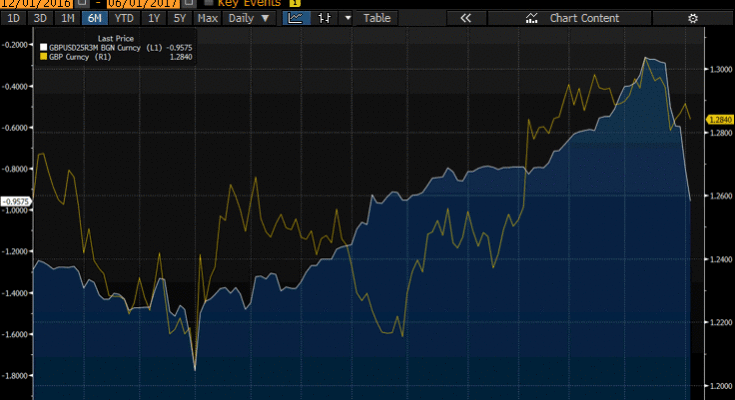
Â
Sterling is faring better than one would have expected given that some polls suggest that the Tories could lose their majority in Parliament in next week’s election.  That said, in the winner-take-all, first-past-the-post system in the UK, it is difficult to go from the national opinion polls to the number of seats. The most likely case according to five of the top six pollsters is that the Tories secure a larger majority. Â
After falling four days last week, sterling appreciated in the first three sessions this week and is essentially giving back yesterday’s gains today. However, below the surface, things do not appear as calm. Some market participants appear to be buying sterling puts for protection. Â
Even if one does not use options, developments there can help shed led on what is happening, and can assist in the price discovery process. Volatility has been trending up since reaching a two-year low in the middle of May. The three-month implied volatility has risen from about 6.82% to 8.5%.The increase in volatility does not appear in the historic (realized) volatility, which has been flat near 8.25%-8.45%.That suggests that the increase in implied volatility is coming from the demand for options. Â
We then look at the skew between puts and calls. The skew has consistently favored puts over calls, but as sterling rallied this year, the put premium fell. On May 24 it was 0.24%, the smallest in several years.It now stands at nearly 1.0%, a four-fold increase. Â
The Great Graphic, created on Bloomberg, shows the options skew (three-month 25 delta risk reversal) in the white line, and sterling is the yellow line. The takeaway is that the market appears to be more nervous than the relatively firm sterling in the spot market suggests. Typically, one might expect those with sterling exposure to sell calls (and receive funds) rather than buy puts (new expenditure). The buyers of puts might not be buying insurance as much as taking a punt on the direction of sterling.  Â

